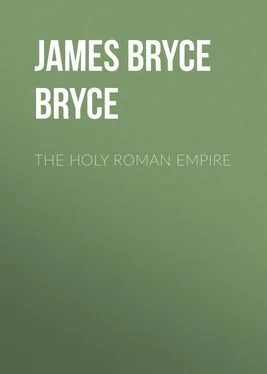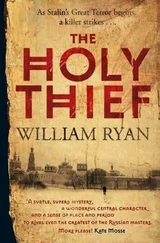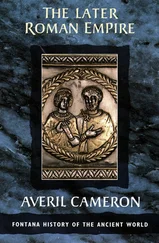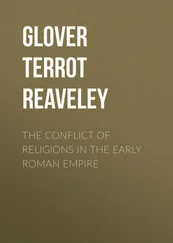James Bryce - The Holy Roman Empire
Здесь есть возможность читать онлайн «James Bryce - The Holy Roman Empire» — ознакомительный отрывок электронной книги совершенно бесплатно, а после прочтения отрывка купить полную версию. В некоторых случаях можно слушать аудио, скачать через торрент в формате fb2 и присутствует краткое содержание. Жанр: foreign_antique, foreign_prose, Историческая проза, на английском языке. Описание произведения, (предисловие) а так же отзывы посетителей доступны на портале библиотеки ЛибКат.
- Название:The Holy Roman Empire
- Автор:
- Жанр:
- Год:неизвестен
- ISBN:нет данных
- Рейтинг книги:4 / 5. Голосов: 1
-
Избранное:Добавить в избранное
- Отзывы:
-
Ваша оценка:
- 80
- 1
- 2
- 3
- 4
- 5
The Holy Roman Empire: краткое содержание, описание и аннотация
Предлагаем к чтению аннотацию, описание, краткое содержание или предисловие (зависит от того, что написал сам автор книги «The Holy Roman Empire»). Если вы не нашли необходимую информацию о книге — напишите в комментариях, мы постараемся отыскать её.
The Holy Roman Empire — читать онлайн ознакомительный отрывок
Ниже представлен текст книги, разбитый по страницам. Система сохранения места последней прочитанной страницы, позволяет с удобством читать онлайн бесплатно книгу «The Holy Roman Empire», без необходимости каждый раз заново искать на чём Вы остановились. Поставьте закладку, и сможете в любой момент перейти на страницу, на которой закончили чтение.
Интервал:
Закладка:
The Franks.
Of the new monarchies that had risen on the ruins of Rome, that of the Franks was by far the greatest. In the third century they appear, with Saxons, Alemanni, and Thuringians, as one of the greatest German tribe leagues. The Sicambri (for it seems probable that this famous race was a chief source of the Frankish nation) had now laid aside their former hostility to Rome, and her future representatives were thenceforth, with few intervals, her faithful allies. Many of their chiefs rose to high place: Malarich receives from Jovian the charge of the Western provinces; Bauto and Mellobaudes figure in the days of Theodosius and his sons; Meroveus (if Meroveus be a real name) fights under Aetius against Attila in the great battle of Chalons; his countrymen endeavour in vain to save Gaul from the Suevi and Burgundians. Not till the Empire was evidently helpless did they claim a share of the booty; then Clovis, or Chlodovech, chief of the Salian tribe, leaving his kindred the Ripuarians in their seats on the lower Rhine, advances from Flanders to wrest Gaul from the barbarian nations which had entered it some sixty years before.
A.D. 486.
Few conquerors have had a career of more unbroken success. By the defeat of the Roman governor Syagrius he was left master of the northern provinces: the Burgundian kingdom in the valley of the Rhone was in no long time reduced to dependence: last of all, the Visigothic power was overthrown in one great battle, and Aquitaine added to the dominions of Clovis. Nor were the Frankish arms less prosperous on the other side of the Rhine. The victory of Tolbiac led to the submission of the Alemanni: their allies the Bavarians followed, and when the Thuringian power had been broken by Theodorich I (son of Clovis), the Frankish league embraced all the tribes of western and southern Germany. The state thus formed, stretching from the Bay of Biscay to the Inn and the Ems, was of course in no sense a French, that is to say, a Gallic monarchy. Nor, although the widest and strongest empire that had yet been founded by a Teutonic race, was it, under the Merovingian kings, a united kingdom at all, but rather a congeries of principalities, held together by the predominance of a single nation and a single family, who ruled in Gaul as masters over a subject race, and in Germany exercised a sort of hegemony among kindred and scarcely inferior tribes. But towards the middle of the eighth century a change began. Under the rule of Pipin of Herstal and his son Charles Martel, mayors of the palace to the last feeble Merovingians, the Austrasian Franks in the lower Rhineland became acknowledged heads of the nation, and were able, while establishing a firmer government at home, to direct its whole strength in projects of foreign ambition. The form those projects took arose from a circumstance which has not yet been mentioned. It was not solely or even chiefly to their own valour that the Franks owed their past greatness and the yet loftier future which awaited them, it was to the friendship of the clergy and the favour of the Apostolic See. The other Teutonic nations, Goths, Vandals, Burgundians, Suevians, Lombards, had been most of them converted by Arian missionaries who proceeded from the Roman Empire during the short period when Arian doctrines were in the ascendant. The Franks, who were among the latest converts, were Catholics from the first, and gladly accepted the clergy as their teachers and allies. Thus it was that while the hostility of their orthodox subjects destroyed the Vandal kingdom in Africa and the Ostrogothic kingdom in Italy, the eager sympathy of the priesthood enabled the Franks to vanquish their Burgundian and Visigothic enemies, and made it comparatively easy for them to blend with the Roman population in the provinces. They had done good service against the Saracens of Spain; they had aided the English Boniface in his mission to the heathen of Germany 37 37 'Denique gens Francorum multos et fœcundissimos fructus Domino attulit, non solum credendo, sed et alios salutifere convertendo,' says the emperor Lewis II in A.D. 871.
; and at length, as the most powerful among Catholic nations, they attracted the eyes of the ecclesiastical head of the West, now sorely bested by domestic foes.
Italy: the Lombards.
Since the invasion of Alboin, Italy had groaned under a complication of evils. The Lombards who had entered along with that chief in A.D. 568 had settled in considerable numbers in the valley of the Po, and founded the duchies of Spoleto and Benevento, leaving the rest of the country to be governed by the exarch of Ravenna as viceroy of the Eastern crown. This subjection was, however, little better than nominal. Although too few to occupy the whole peninsula, the invaders were yet strong enough to harass every part of it by inroads which met with no resistance from a population unused to arms, and without the spirit to use them in self-defence. More cruel and repulsive, if we may believe the evidence of their enemies, than any other of the Northern tribes, the Lombards were certainly singular in their aversion to the clergy, never admitting them to the national councils. Tormented by their repeated attacks, Rome sought help in vain from Byzantium, whose forces, scarce able to repel from their walls the Avars and Saracens, could give no support to the distant exarch of Ravenna.
The Popes.
The Popes were the Emperor's subjects; they awaited his confirmation, like other bishops; they had more than once been the victims of his anger 38 38 Martin, as in earlier times Sylverius.
. But as the city became more accustomed in independence, and the Pope rose to a predominance, real if not yet legal, his tone grew bolder than that of the Eastern patriarchs. In the controversies that had raged in the Church, he had had the wisdom or good fortune to espouse (though not always from the first) the orthodox side: it was now by another quarrel of religion that his deliverance from an unwelcome yoke was accomplished 39 39 A singular account of the origin of the separation of the Greeks and Latins occurs in the treatise of Radulfus de Columna (Ralph Colonna, or, as some think, de Coloumelle), De translatione Imperii Romani (circ. 1300). 'The tyranny of Heraclius,' says he, 'provoked a revolt of the Eastern nations. They could not be reduced, because the Greeks at the same time began to disobey the Roman Pontiff, receding, like Jeroboam, from the true faith. Others among these schismatics (apparently with the view of strengthening their political revolt) carried their heresy further and founded Mohammedanism.' Similarly, the Franciscan Marsilius of Padua (circa 1324) says that Mohammed, 'a rich Persian,' invented his religion to keep the East from returning to allegiance to Rome. It is worth remarking that few, if any, of the earlier historians (from the tenth to the fifteenth century) refer to the Emperors of the West from Constantine to Augustulus: the very existence of this Western line seems to have been even in the eighth or ninth century altogether forgotten.
.
Iconoclastic controversy.
The Emperor Leo, born among the Isaurian mountains, where a purer faith may yet have lingered, and stung by the Mohammedan taunt of idolatry, determined to abolish the worship of images, which seemed fast obscuring the more spiritual part of Christianity. An attempt sufficient to cause tumults among the submissive Greeks, excited in Italy a fiercer commotion. The populace rose with one heart in defence of what had become to them more than a symbol: the exarch was slain: the Pope, though unwilling to sever himself from the lawful head and protector of the Church, must yet excommunicate the prince whom he could not reclaim from so hateful a heresy. Liudprand, king of the Lombards, improved his opportunity: falling on the exarchate as the champion of images, on Rome as the minister of the Greek Emperor, he overran the one, and all but succeeded in capturing the other. The Pope escaped for the moment, but saw his peril; placed between a heretic and a robber, he turned his gaze beyond the Alps, to a Catholic chief who had just achieved a signal deliverance for Christendom on the field of Poitiers. Gregory II had already opened communications with Charles Martel, mayor of the palace, and virtual ruler of the Frankish realm 40 40 Anastasius, Vitæ Pontificum Romanorum i. ap. Muratori.
. As the crisis becomes more pressing, Gregory III finds in the same quarter his only hope, and appeals to him, in urgent letters, to haste to the succour of Holy Church 41 41 Letter in Codex Carolinus , in Muratori's Scriptores Rerum Italicarum , vol. iii. (part 2nd), addressed 'Subregulo Carolo.'
.
Интервал:
Закладка:
Похожие книги на «The Holy Roman Empire»
Представляем Вашему вниманию похожие книги на «The Holy Roman Empire» списком для выбора. Мы отобрали схожую по названию и смыслу литературу в надежде предоставить читателям больше вариантов отыскать новые, интересные, ещё непрочитанные произведения.
Обсуждение, отзывы о книге «The Holy Roman Empire» и просто собственные мнения читателей. Оставьте ваши комментарии, напишите, что Вы думаете о произведении, его смысле или главных героях. Укажите что конкретно понравилось, а что нет, и почему Вы так считаете.












